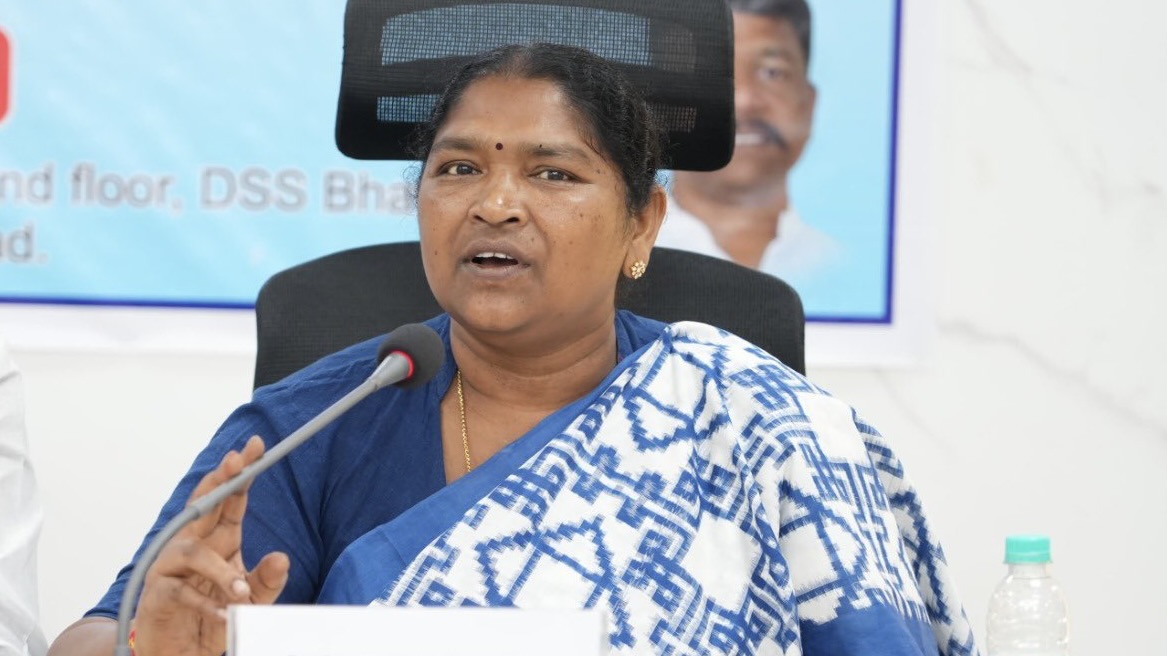GO Ms 49, issued in May 2025 by the Telangana Forest Department, declares 1,492.88 sq km across the Kagaznagar and Asifabad forest divisions as the Komaram Bheem Conservation Reserve. In its sharply worded statement, the CPI (Maoist) alleged that GO 49 was aimed at forcibly evicting Adivasi communities from forest regions under the pretext of establishing a wildlife conservation corridor.
Published Jun 27, 2025 | 9:54 PM ⚊ Updated Jun 27, 2025 | 9:54 PM

The letter has placed Seethakka in a delicate position, forcing her to balance her identity and past with the demands of governance.
Synopsis: Telangana Minister Danasari Seethakka has firmly refuted Maoist allegations that Government Order Ms 49 threatens tribal welfare, reaffirming her commitment to protecting Adivasi rights and denying any intent of displacement. The controversial order, which designates nearly 1,500 sq km as a conservation reserve, has triggered backlash from tribal activists, opposition parties, and Maoists, who allege it serves corporate interests.
Telangana Minister for Panchayat Raj, Rural Development, Women and Child Welfare, Danasari Anasuya Seethakka has firmly rejected allegations made by the Communist Party of India (Maoist) regarding the controversial Government Order (GO) Ms 49, reaffirming her commitment to safeguarding the rights and welfare of tribal communities.
Speaking to reporters during an informal interaction in Mulugu on Friday, 27 June, the Minister responded to a letter purportedly issued by the Maoists on 26 June.
The letter accused the state government of betraying Adivasi interests under the guise of wildlife conservation.
GO Ms 49, issued in May 2025 by the Telangana Forest Department, declares 1,492.88 sq km across the Kagaznagar and Asifabad forest divisions as the Komaram Bheem Conservation Reserve.
The area is considered a key stretch in the Kawal–Tadoba Tiger Corridor, which extends into neighbouring Maharashtra.
The government has defended the move as a legal and ecological initiative under Section 36A of the Wildlife Protection Act, 1972, intended to strengthen biodiversity and habitat protection.
However, the order has drawn criticism from tribal rights activists, opposition leaders, and now, the Maoists.
The letter, signed by CPI (Maoist) Telangana spokesperson Jagan, directly addressed Seethakka, calling on her to take full responsibility for protecting tribal populations in Kumuram Bheem Asifabad, Mulugu, and Bhadradri-Kothagudem districts.
It has placed Seethakka in a delicate position, forcing her to balance her identity and past with the demands of governance.
Seethakka, a former Maoist herself and one of the state’s most prominent tribal leaders, questioned the authenticity of the letter, hinting that it could have been circulated by political opponents.
“I have rivals among both tribals and non-tribals. Some are uncomfortable that a tribal woman has risen to become a minister holding key portfolios,” she said.
Despite her doubts about the letter’s source, the Minister stressed that she has always opposed any form of displacement affecting tribal families.
“The moment concerns were raised about GO 49, I spoke directly with relevant officials, who clarified that no immediate threats or eviction plans were underway. I will never allow any policy to harm tribal livelihoods in the name of forest or wildlife conservation,” she said.
She said she had convened a meeting with Congress MPs and MLAs to assess the fallout from the order.
“Together with Forest Minister Konda Surekha, I instructed the forest department not to interfere in tribal areas or obstruct their access to resources,” she added.
While acknowledging that isolated incidents of harassment by officials had taken place, she attributed these to the influence of individual political leaders rather than a systemic issue.
“Let any allegations, whether from Maoists or others, be based on facts. Falsehoods will only escalate tensions unnecessarily,” she cautioned.
In its sharply worded statement, the CPI (Maoist) alleged that GO 49 was aimed at forcibly evicting Adivasi communities from forest regions under the pretext of establishing a wildlife conservation corridor.
The party claimed that the true purpose behind the order was to pave the way for private corporations – particularly the Adani Group – to enter mineral-rich tribal territories.
“The forests are not for tigers – but for those wearing the skin of tigers,” the statement asserted, warning that tribal culture and community identity would “gradually disappear” unless the order was rolled back.
The Maoists demanded the complete withdrawal of GO 49, accusing the Congress-led government of going back on its electoral promises to protect tribal lands.
“Despite constitutional and legal protections – such as the Fifth Schedule, PESA Act (1996), Forest Rights Act (2006), and 1/70 Act – both the central and state governments continue to collude with corporates in displacing Adivasis,” the letter said.
Critics of GO 49 argue that its provisions – such as restrictions on development, potential relocation of villages, and curbs on forest access – could seriously affect Adivasi livelihoods.
The formation of a Management Committee, made up of forest officials, NGOs, and panchayat representatives, has done little to ease fears of cultural and economic marginalisation.
The controversy has sparked political tension beyond party lines.
At a meeting held on Friday at the Integrated Tribal Development Agency (ITDA) in Utnoor, Minister Jupally Krishna Rao sought to calm public concern, stating that the order had not yet come into force as no formal notification had been issued.
His reassurance, however, failed to convince opposition leaders. Bharatiya Janata Party’s tribal legislators, who were present at the meeting, accused the government of putting tribal livelihoods at risk for corporate interests.
The discussion turned heated, reflecting the growing unease in tribal constituencies.
Although the state government has not revoked or amended GO 49, pressure is mounting from tribal civil society groups, opposition parties, and now the Maoists.
The political consequences of ignoring these voices could be significant for the Congress-led government, which has positioned itself as a pro-tribal and inclusive administration.
(Edited by Dese Gowda)
